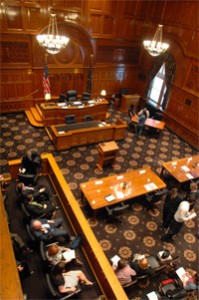The Eyes Have It
 During my freshman year at Boston University, I was engaged to a girl from just outside of Houston. It didn’t work out in the end, but it was a good relationship, and so I’ve tended to refrain from joining in on the jokes people like to make about Texans, particularly as pertains to their creative (i.e., absent) approach toward the rights of criminal defendants. But even I can’t resist taking some jabs at the Texas Supreme Court for this decision.
During my freshman year at Boston University, I was engaged to a girl from just outside of Houston. It didn’t work out in the end, but it was a good relationship, and so I’ve tended to refrain from joining in on the jokes people like to make about Texans, particularly as pertains to their creative (i.e., absent) approach toward the rights of criminal defendants. But even I can’t resist taking some jabs at the Texas Supreme Court for this decision.
To summarize: Andre Thomas killed his wife, 4-year old son, and 13-month-old niece. He then (and I honestly can’t phrase this better than the article did)
walked into the Sherman Police Department and told a dispatcher he had murdered the three, then told officers he put his victims’ hearts in his pocket, left their apartment, took them home, put the organs in a plastic bag and threw them in the trash. He said G-d had told him to commit the killings.
This would probably be enough to give anyone pause, but it gets better (or worse, depending on how you look at it).

 Kudos (on getting this far) and best wishes (as we move forward) to the sixteen upper-level students who are competing this week in the quarterfinals of the
Kudos (on getting this far) and best wishes (as we move forward) to the sixteen upper-level students who are competing this week in the quarterfinals of the